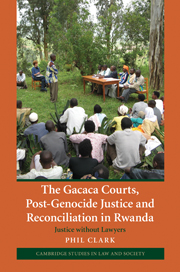Book contents
- Frontmatter
- Contents
- Acknowledgements
- List of abbreviations
- Map of Rwanda
- Introduction
- 1 Framing gacaca: six transitional justice themes
- 2 Moulding tradition: the history, law and hybridity of gacaca
- 3 Interpreting gacaca: the rationale for analysing a dynamic socio-legal institution
- 4 The gacaca journey: the rough road to justice and reconciliation
- 5 Gacaca's modus operandi: engagement through popular participation
- 6 Gacaca's pragmatic objectives
- 7 Accuser, liberator or reconciler?: Truth through gacaca
- 8 Law, order and restoration: peace and justice through gacaca
- 9 Mending hearts and minds: healing and forgiveness through gacaca
- 10 (Re)fusing social bonds: gacaca and reconciliation
- Conclusion
- Glossary
- Bibliography
- Index
4 - The gacaca journey: the rough road to justice and reconciliation
Published online by Cambridge University Press: 06 December 2010
- Frontmatter
- Contents
- Acknowledgements
- List of abbreviations
- Map of Rwanda
- Introduction
- 1 Framing gacaca: six transitional justice themes
- 2 Moulding tradition: the history, law and hybridity of gacaca
- 3 Interpreting gacaca: the rationale for analysing a dynamic socio-legal institution
- 4 The gacaca journey: the rough road to justice and reconciliation
- 5 Gacaca's modus operandi: engagement through popular participation
- 6 Gacaca's pragmatic objectives
- 7 Accuser, liberator or reconciler?: Truth through gacaca
- 8 Law, order and restoration: peace and justice through gacaca
- 9 Mending hearts and minds: healing and forgiveness through gacaca
- 10 (Re)fusing social bonds: gacaca and reconciliation
- Conclusion
- Glossary
- Bibliography
- Index
Summary
INTRODUCTION
As we saw in Chapter 2, present-day gacaca is the result of years of difficult argument in Rwandan society about the most appropriate social, legal and political responses to the backlog of genocide cases. Since gacaca was codified and operational, it has become embedded within, and heavily reliant upon the success of, a complex process involving the transfer of detainees from prison to their home communities, where eventually they face gacaca trials. It is necessary therefore to explore the personal, emotional responses of the population to the provisional release of genocide suspects, which affect popular interpretations and perceptions of gacaca. This chapter and the rest of the book refer to what I call the ‘gacaca journey’. This journey comprises six phases: the imprisonment of genocide suspects; the release of selected suspects into eighteen ingando around Rwanda; suspects' three-month-long civic education in the camps; their release into their home communities; suspects' trials at gacaca; and finally, their sentencing and, in cases where they are found guilty of serious enough crimes, their return to prison and/or participation in TIG. This is fundamentally the detainees' journey. However, it unavoidably affects the wider population, especially when detainees return to live among survivors in the same locations where they are accused of committing genocide crimes.
In this chapter, I provide a narrative of the entire gacaca journey, based on first-hand observations of key events during that period and interviews with participants.
- Type
- Chapter
- Information
- The Gacaca Courts, Post-Genocide Justice and Reconciliation in RwandaJustice without Lawyers, pp. 98 - 131Publisher: Cambridge University PressPrint publication year: 2010



